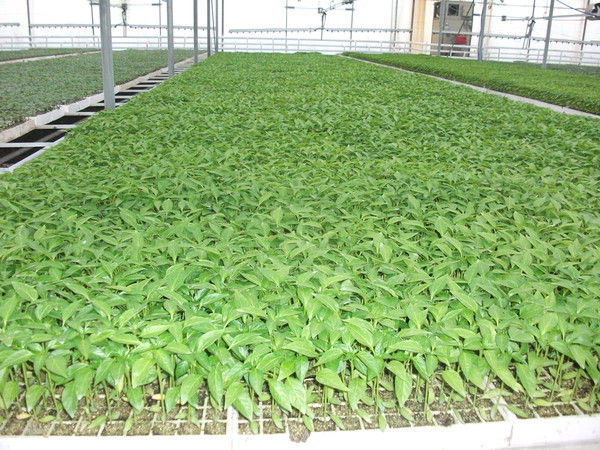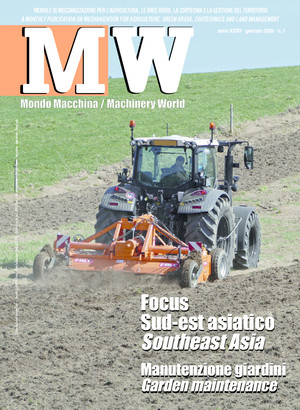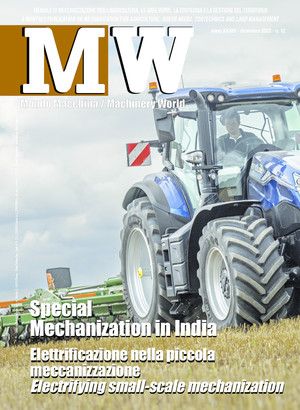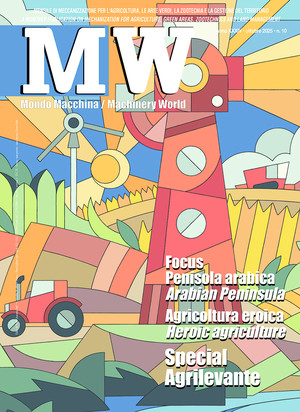
Edmond Panariti: a policy for cooperation
The South East Europe EIMA event is targeted on the entire Balkan region from the starting point of Albania, a country which is not only hosting the mechanization exposition but is also focusing great attention on agriculture and the development of the primary sector named as a priority on the government's agenda. Mondo Macchina/Machinery World interviewed Edmond Panariti, the minister for agriculture for the Land of the Eagles
The Albanian government and minister for agriculture are listing the development of the primary sector among the priorities on their own political agenda. What are the conditions in the sector and the measures enacted for its growth?
The agricultural sector in Albania has been growing during the recent years, despite the economic crisis, and is continuing to grow. At the same time the sector still has great potential growth. The government objective is turn it from a subsistence agriculture into an economic sector which can export and which can create new jobs. This will be achieved by supporting the production of primary input but also that of processed agricultural products. In general, we are gradually taking steps which will reduce costs and make production more economically efficient. The government is also encouraging the set up of a network of wholesale collection centra which will greatly improve the access of the farmers to the the markets and to consumers.
Your executive has established that as of next June, subsidies and family allowances will be entrusted to women. What role can women play also in the development of the country's agriculture?
It is true that the current policy of the government favours applicants-women in granting financial aid. However, the role of women in agricultural production still needs to be greatly enhanced. Currently, agriculture in Albania is dominated by men. The number of women active in the sector is by 10 times smaller than that of man-labour force. The women can play an important role in agriculture in Albania because the sector is based on family farming. The size of the farms in Albania is small compared to that of EU average, which conditions traditional farming and working methods. In this respect, the role of women is central. They can develop local products, giving them an added value. Adding value to agricultural products is a worthwhile endevour because of the diversification of the markets with higher economic returns. This in turn will boost agritourism in which women, again, play a crucial role.
Modernizing and strengthening the Albanian farm machinery inventory can become the keystone for the growth of the primary sector. What are the leading mechanization requirements at the national level and what measures in the field can support this updating?
At present we have in use mainly small and semi-sized tractors. The government, through the EU-funded and national schemes, supports the purchase of all types of vehicles, but one of our current objectives is to encourage the purchase of the larger types of tractors which are the most suitable ones for the cultivation of land in the open fields. Because of their high prices this can only be realized if farmers buy these vehicles collectively. We are trying to orient the farmers towards such practices which are known and widely used in other European countries as well.
The first edition of Eima South East Europe dedicated to Italian agricultural machinery and equipment for the Albanian market will be held in Tirana in mid-June. What are the expectations of this event and what are the possible forms of collaboration with the Italian industries in the sector?
Farmers and other interested parties expect to find and see agricultural mechanics of high quality as the Italian products are highly valued in the Albanian market. With the support of the Ministry of Agriculture it is also taken care that the exposition gives all the necessary information to these parties. Given the fact that events of this kind are regularly organized its success will lie in securing the cooperation and maintaining the links between the offerors and the interested farmers during and after the event. The Ministry is ready to help and facilitate contacts in this respect.
Albania and Italy have a long tradition of relations and trade. What about the possibility of further agreements between our countries aimed at economic recovery, social solidarity and the creation of jobs?
We have a very positive experience in cooperation, especially in the field of public veterinary health, equipment and new technologies and, more recently, also in the field of agrarian credit. Our cooperation has to be stepped up on this last point. Agrarian mechanization is another field in which we can increase and orient development. Product quality is another field for the concentration of our support, especially for the value added for our local products, and this is also important for the development of agritourism and family farming where Italian know-how is greatly appreciated.
At the end of the first half of 2014 the European Union will decide on the status of Albania as a candidate for accession. What are your country's expectations from the economic, social and cultural points of view?
A very high percentage of Albanians see the EU membership as a positive thing. It is important to say that the main reason for that is their belief that the accession to the EU will improve their life in their own country. The term “europianisation” is a term that is used in the everyday life of Albanians. By this they mean a society with more economic opportunities, but also, perhaps, more importantly, a more just society, with a well-functioning judicial system and in overall, more equality and lesser social gaps.








